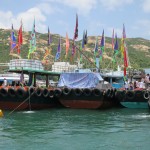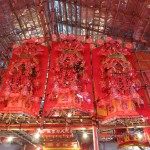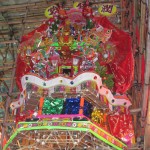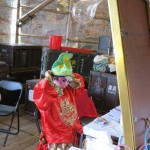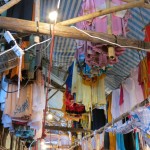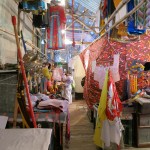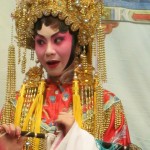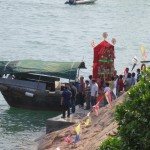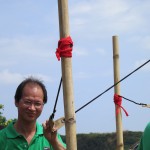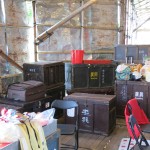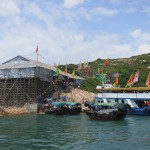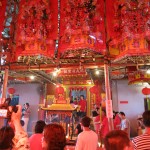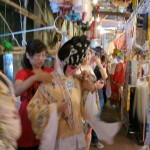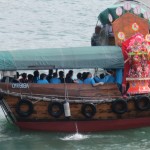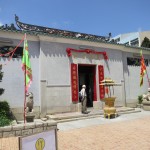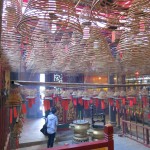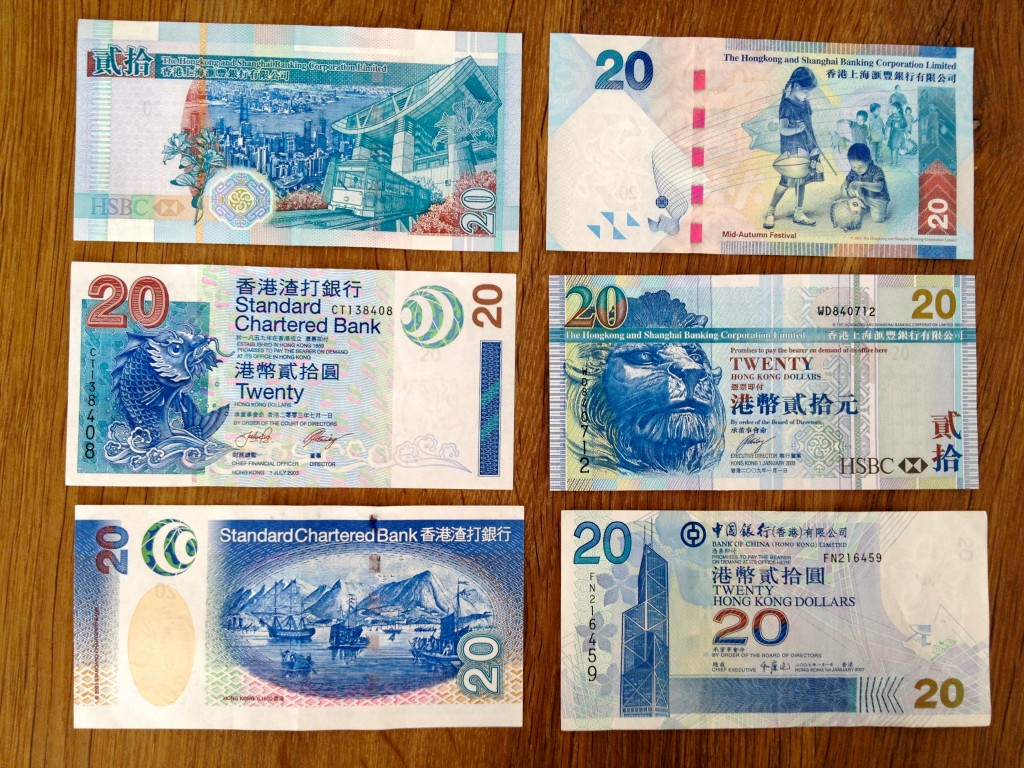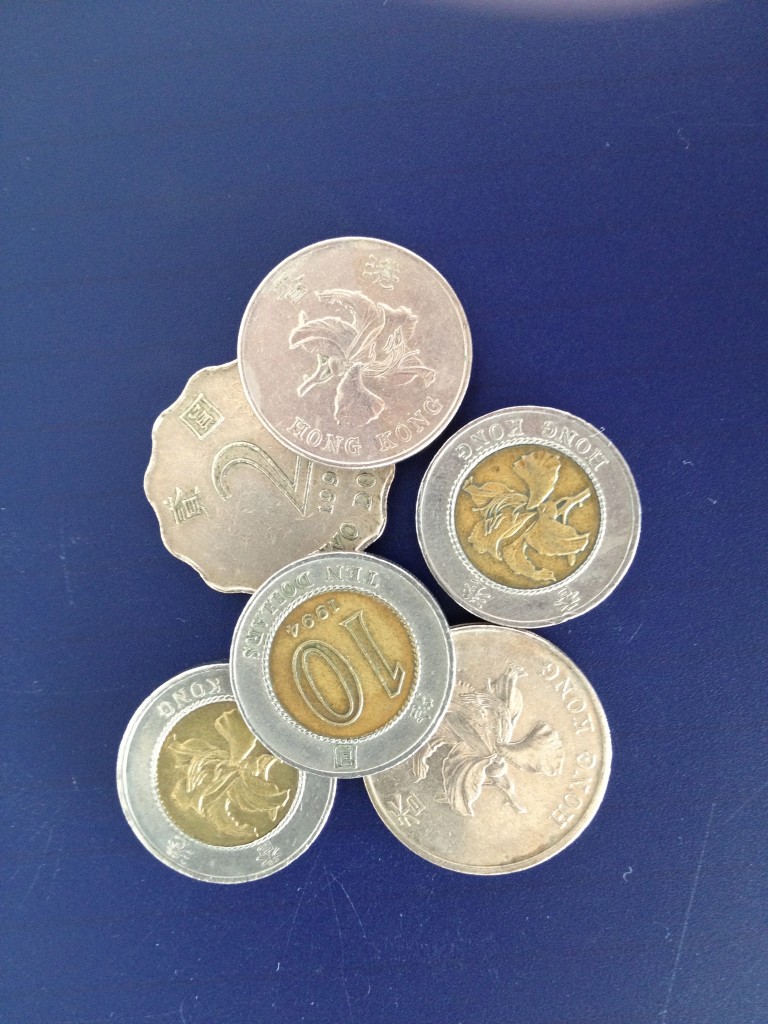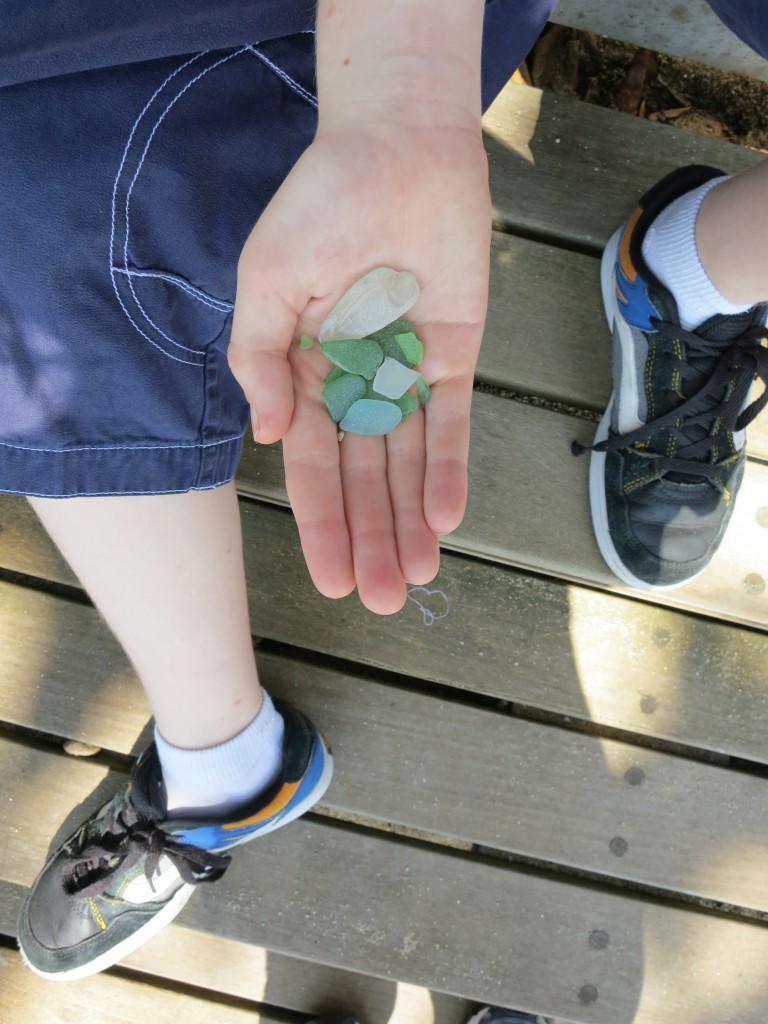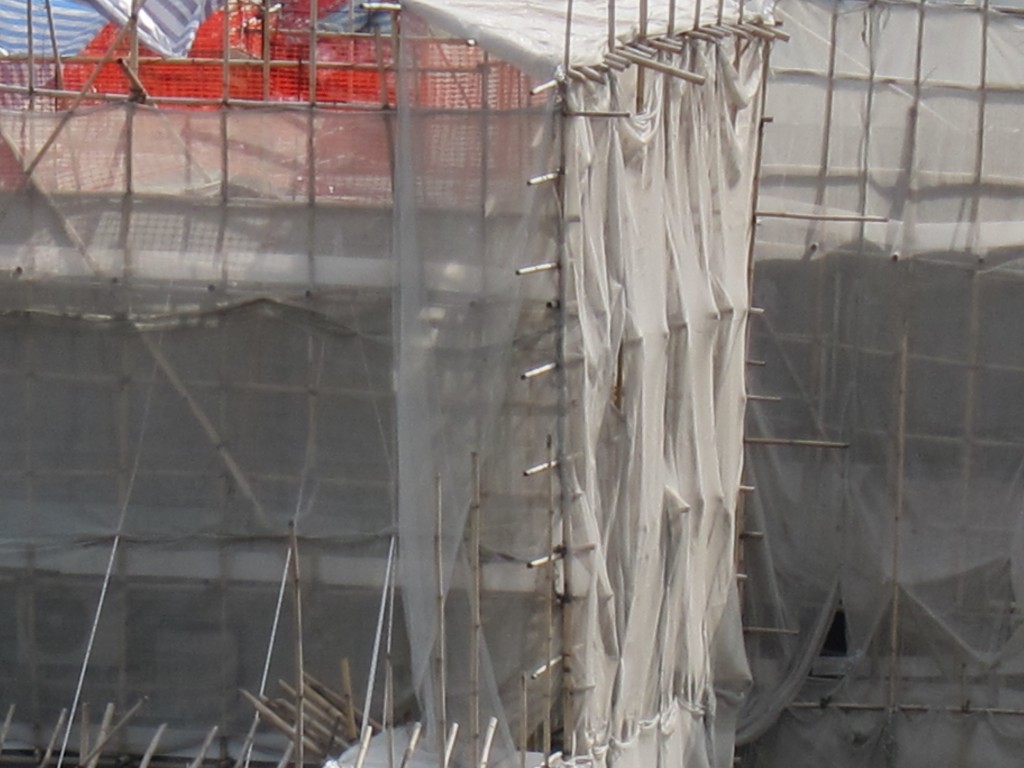You can’t walk far in Hong Kong without coming across a Tin Hau temple. Tin Hau is the Goddess of the Sea, a deity here and in many parts of Asia. Temples honoring Tin Hau are found all over Hong Kong, sometimes separated from their typical place on the shore by blocks of reclaimed land. The Tin Hau temples are colorful and varied. Those wishing to ask favors or protection or luck from Tin Hau burn incense in the temples and make offerings.
The Tin Hau festival, in honor of Tin Hau’s birthday, fell on Friday the 13th this year. I was lucky enough to join a group attending one of the few traditional celebrations left in Hong Kong. We traveled on a Junk to the small fishing island of Po Tai to observe the festival. Po Tai is one of the last areas where the traditional celebrations still take place, including a Scramble and the Cantonese Opera.
As you might deduce from a festival dedicated to the Goddess of the Sea, those who earn their living from the sea make up the main group of celebrants. This is one of the reasons the traditions are dying. It’s easy to see why; pollution, reclamation and overfishing have decimated the fish populations around Hong Kong; livelihoods attached to the sea necessarily follow the catch’s decline. The festival includes worship groups made up of fisher folk carrying elaborately constructed offerings to Tin Hau called Fa Paos. The number of worship groups- comprised of groups attached to a fishing boat or area – has declined dramatically in the past 30 years. The festival we attended on Po Tai island used to host more than 60 worship groups. This year there were only 28.
The 90 minute junk ride on not-so-calm seas took us by boats festooned with colorful flags, and ended at a small rocky island. By far, the sidewalks were the best improvement on the island, far outstripping the ramshackle huts and houses. This sidewalk (with handicap ramps!) wound around the island up to the Tin Hau temple. Facing the temple was a tin and bamboo structure perched precariously on a rocky outcropping, obscuring the Tin Hau temple entirely. This, I learned, was the Opera House, constructed for the celebration.
The most exciting part of the trip for me was wandering backstage at the temporary opera house, constructed of lashed bamboo (remember the scaffolding?) and covered in tin. The stage in the Opera House faces the front of the temple, as the performance is to please Tin Hau. According to our guide, Cantonese Opera is a dying art. Few troupes still exist, and the expense to hire them means many fisherfolk can’t afford to host the lavish festivals popular in previous decades. Allowed into the backstage areas in groups of 6, we were allowed a glimpse of the troupe applying makeup, having their hair done, and getting costumes on. Beautiful costumes hung from the rafters and the dressing areas were cordoned off with sheets. I admit I had a moment of vertigo – who would ever have thought that the backstage of a Cantonese opera would so strongly remind me of childhood visits staying in the upstairs of my Grandma’s house in northern Minnesota? The lax security (completely at odds with the ridiculously large police presence) meant soon our entire group of 30 was meandering behind the stage on groaning floorboards loosely covering a jungle gym of bamboo. The combination of 30 be-cameraed, wilting westerners, elaborately costumed, lavishly made-up Cantonese performers, and the slapdash construction gave me pause. Could I see the headlines? Yes, I could. Before the structure had a chance to collapse under the weight of our enthusiasm, the expats moved outside and around to the front of the house for the start of the show.
The Opera was a jangle of twangs and sharp tones that sounded completely dissonant to my ears. While this Opera was part of the main event, it seemed the audience couldn’t have cared less. People wandered in and out, burning incense or grabbing a drink or some food, held conversations, and generally seemed to regard the Opera as a distraction, at best. Perhaps it is not so surprising that it is a dying art. Admittedly, I was thankful for the moving crowd, as I found the incense so heavy, and the music so discordant, that I needed a break more than once in the 45 minute performance. The story of the Opera was hard to decipher. However, our guide explained that the first few minutes were a Happy Birthday to Tin Hau, followed by a performance lauding the birth of baby boys (never mind that Tin Hau was a real girl herself, long ago). As our guide explained, only women who provided baby boys were appreciated, and women who couldn’t were “not good.” This cultural preference was made clear to me once when I was shopping with the boys in a local street market. An older woman grabbed my hips, gave me a huge smile and pointing at my three sons, exclaimed “very good!”. I have a friend who has three girls; she gets clucks of disappointment.
After the Opera, the throng moved outside to get ready for the Scramble. In past decades, all worship groups would participate in a contentious scramble for sticks shot off with fireworks. The scramble tradition has been banned from most celebrations due to the intense fighting that ensued in pursuit of these sticks. When you consider that getting the right stick means ensuring the Goddess’s good favor for another year, it is not surprising fighting used to be the norm. On Po Tai, the “scramble” has been reduced to a lucky draw involving slingshots. These days, each group gets a number that corresponds to one of the Fa Paos. We watched as sticks were slingshot out to groups, and then followed the worship groups into the temporary Opera House to collect their Fa Pao. Here the police presence made itself known by barring many of the groups from heading inside. They did allow a few of us in, but once an officer told me that I could take a picture, but should leave quickly, I hightailed it out.
Once the Fa Paos are collected, each is carried back to the worship group’s boat and taken on board. The boat then “bows” to Tin Hau by doing three turns in the harbor. Our guide explained that the Fa Paos are then taken back to a big dinner and all the items are “auctioned” off. The amount paid is a pledge to contribute to the construction of the group’s Fa Pao for the next year.
On the way home, our Junk did three turns in the harbor and set off for Hong Kong island on calmer (pleased?) seas.
- Fa Paos and a glimpse of the tin ceiling of the Opera House
- The Fao Pos are all built on a scaffolding of bamboo. Note the goldfish and the red “cloth” surrounding the offerings.
- These slingshots are used to fire the sticks that worship groups will “scramble” for.


